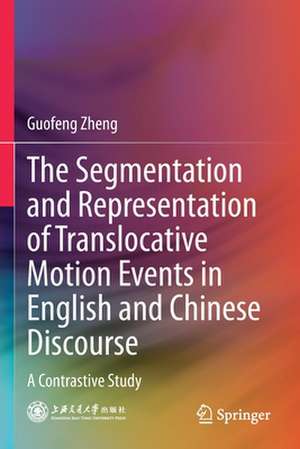The Segmentation and Representation of Translocative Motion Events in English and Chinese Discourse: A Contrastive Study
Autor Guofeng Zhengen Limba Engleză Paperback – 3 dec 2021
| Toate formatele și edițiile | Preț | Express |
|---|---|---|
| Paperback (1) | 636.12 lei 6-8 săpt. | |
| Springer Nature Singapore – 3 dec 2021 | 636.12 lei 6-8 săpt. | |
| Hardback (1) | 642.36 lei 6-8 săpt. | |
| Springer Nature Singapore – 2 dec 2020 | 642.36 lei 6-8 săpt. |
Preț: 636.12 lei
Preț vechi: 748.38 lei
-15% Nou
Puncte Express: 954
Preț estimativ în valută:
121.72€ • 127.09$ • 100.74£
121.72€ • 127.09$ • 100.74£
Carte tipărită la comandă
Livrare economică 04-18 aprilie
Preluare comenzi: 021 569.72.76
Specificații
ISBN-13: 9789813340398
ISBN-10: 9813340398
Ilustrații: XVIII, 190 p. 114 illus., 6 illus. in color.
Dimensiuni: 155 x 235 mm
Greutate: 0.3 kg
Ediția:1st ed. 2021
Editura: Springer Nature Singapore
Colecția Springer
Locul publicării:Singapore, Singapore
ISBN-10: 9813340398
Ilustrații: XVIII, 190 p. 114 illus., 6 illus. in color.
Dimensiuni: 155 x 235 mm
Greutate: 0.3 kg
Ediția:1st ed. 2021
Editura: Springer Nature Singapore
Colecția Springer
Locul publicării:Singapore, Singapore
Cuprins
Introduction.- MEP Principles and the Segmentation and Representation of TME.- Research Design and Data Tagging.- General Statistical Description of English and Chinese TME Constructions.- Contrasting the Representation of TMEs in English and Chinese.- Conclusion.
Notă biografică
Guofeng Zheng is an Associate Professor at East China University of Science and Technology (ECUST). He received his Ph.D. degree in Linguistics and Applied Linguistics from Shanghai International Studies University in 2011. He is a member of China Association for Comparative Studies of English and Chinese, Assistant Dean of the School of Foreign Languages at ECUST and Director of ECUST’s Master of Translation and Interpretation Program.
His research over the past 20 years has been devoted to the area of English and Chinese contrastive analysis, and he has published nearly 20 research articles and reviews in journals both within China and abroad. Over the past 10 ten years, he has narrowed his research focus to English and Chinese motion events, establishing himself as one of the most productive researchers in this field. Over the years, he has won many prestigious teaching awards and research funds, e.g. a Nomination for Best Supervisor Team ECUST, 1st Prize for Excellent Teaching and Education ECUST, Model Teacher ECUST, National Social Science Foundation (17XJY003) and Shanghai Education Commission Award.
Textul de pe ultima copertă
This book provides a systematic, contrastive analysis of the segmentation and representation of English and Chinese Translocative Motion Events (TMEs), which possess Macro-Event Property (MEP). It addresses all the issues critical to understanding TMEs in English and Chinese, from event segmentation, MEP principles and the conceptual structure of TMEs and their constituents, to the representation of Actant, Motion, Path and Ground. The book argues that the corpus-based alignment for the TME segmentation in both languages, the parameters of Actant, Motion, Path and Ground and their relevant statistical description are particularly important for understanding English and Chinese TMEs. The linguistic materialization of Actant, Ground, Path and Motion, together with a wealth of tables and figures, offers convincing evidence to support the typological classification of English and Chinese. The book’s suggestions regarding the Talmyan bipartite typology and Bohnemeyer’s MEP contribute to theadvancement of TME studies and language typology, and help learners to understand motion events and English-Chinese typological similarities and differences.
Caracteristici
Is the first book contrasting the segmentation and representation of motion events in English and Chinese Serves as the first book adopting the theory of the macro-event property to analyze Chinese motion events Offers sound, corpus-based analyses of the differences and similarities between English and Chinese motion events Provides cross-linguistic evidence to support the typological classification of English and Chinese in terms of motion event representation Puts forward suggestions for further improving the theory of the macro-event property
